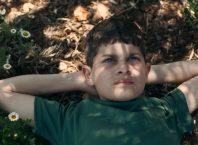Ron Ninio’s film “There Were Nights”, participating in the Israeli feature films competition at the Haifa International Film Festival, is an intensely personal film that subtly situates itself within a wider Israeli context, beginning with its title.
Evoking a sense of longing for a mythical past, the film’s title is taken from a well-known Israeli song “Hayu Leilot” (Hebrew: there were nights), lyrics by Yaakov Orland and music by Mordechai Zeira. Orland (1914 – 2002), poet, translator, editor and Haifa resident since 1954, received the Israel Prize in 1994 for his song lyrics which have become an integral part of Israeli culture. Written in 1938 and recorded many times by Israeli singers of mythic stature, such as Shoshana Damari, I found a 1954 recording by Lea Deganith, which reflects the sound of the times. Telling the story of two pioneers in love, he “tall as a song” with his horse and cart, she, waiting through the night, embroidering a blue shirt, the song itself is a paen to the past, setting the mood for the film.
The film explores love and its limitations at the heart of the family, or rather of two families – the biological family and that of the theater. Ninio eschews easy solutions – in both contexts, love, however deep, is not enough to heal all wounds; good intentions cannot resolve all problems and the characters must find a way to live with the consequences of their decisions.
Shifting between past and present, the film presents a series of moments in the life of Goni. The role is played by Dana Ivgy, a young actress with a surprising range – known for her dramatic roles in “Or” and more recently, “Jaffa”, Ivgy is also part of the Israeli comic troup “Tziporela.” Ivgy’s father, a theater director whose career is destroyed by one mistake, is played by the actress’s father – Moshe Ivgy. The two give a touching performance utterly unmarred by sentimentality. The family circle is completed by Jenya Dodina as the mother. Dodina is an actress of depth and power who can move easily from stage to screen and convey several chapters of a novel in one ironic half smile.
Seeing the film at the festival added another, more intimate dimension as writer/director Ron Ninio addressed the audience after the screening. Ninio dedicated the movie to his parents, Hannah Ben Ari, who was one of the first radio announcers for Kol Israel (the first Israeli radio station) and Avraham Ninio, who “directed wonderful plays” many of which were translated and edited by his wife. “I think they represent a generation which made a great contribution to the culture and theater of this country,” said Ninio, adding, “This is a country that devours its artists. No one remembers them or other artists. The fact that we are here, watching this film, is thanks to people like them. My being here is thanks to them and their brief lives, which were not easy. I hope that perhaps they are watching the movie and that it gives them some measure of comfort.”





